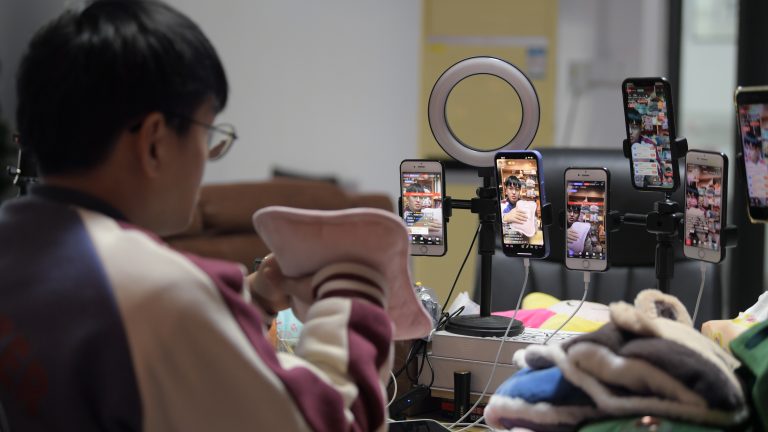For an entire month in March 2023, livestream seller Hou Chunyu spent four hours a day peddling fiber supplements on TikTok’s Chinese sister app, Douyin. Sometimes, she’d end up working past midnight. “This [supplement] contains eight types of fiber, as well as different vitamins and minerals,” the 24-year old would repeat every few minutes, addressing her imagined audience as “babes.” “Even astronauts take this great stuff. Why don’t you give it a try?”
By the end of the month, Hou had not sold a single product. Her livestream channel had only four viewers — two of whom were Hou’s own colleagues. She told Rest of World she had felt like she was talking in front of a mirror — trying to extract a response from an audience, but only hearing her own voice droning on. Despite being paid 12,000 yuan ($1,642) a month, Hou decided to quit the company. “I would have had a mental breakdown if I kept doing this,” she said.
Things weren’t always this hard. When Hou first became a livestream seller in mid-2021, the industry was booming — partly thanks to China’s zero-Covid lockdowns, which forced millions of people to stay at home and shop on their mobile phones. Although unfamiliar in the West, livestream e-commerce is ubiquitous in China, where nearly half the internet users shopped on livestream by mid-2023. Star livestreamers like Austin Li, dubbed the Lipstick King, once sold billions of dollars’ worth of products in one day. Many young women flocked to join the industry, working for small e-commerce companies, with dreams of becoming rich and famous.
But the livestream e-commerce bubble has begun to deflate this year, with the saturated industry facing an economic downturn. Sick of dwindling salaries, longer working hours, and increasing competition to win over frugal Chinese consumers, livestream sellers are beginning to question their job prospects in the industry.
Hou, a broadcast journalism major, moved to Hangzhou in 2022 to become a livestream seller. She was lured by the job’s lucrative promise, in a city that was the hub of Chinese e-commerce. She worked four hours a day, 26 days a month, for a salary of more than 10,000 yuan ($1390) — about double the average income for fresh college graduates.
But in 2023, the job market turned tough, said Hou. Many companies lowered their salaries to 6,000–8,000 yuan ($821–$1,095), and demanded their employees work eight hours a day, she said. As firms went bankrupt, Hou changed jobs frequently. One clothing company dismissed all its staff six days after she joined.

Several other livestream sellers told Rest of World they experienced salary cuts. Li Bing, a 23-year-old livestreamer in Zhoushan, sells toilets and bathroom sinks for a home appliance company. While she had earned up to 15,000 yuan ($2,053) per month in 2022, Li said she could at best make only 8,000 yuan ($1,095) per month this year. He Zi, a 26-year-old livestreamer based in Hangzhou, said her monthly income dropped by 5,000 yuan compared to last year. Livestream sellers’ earnings fell by roughly 30% between 2022 and 2023, in major cities like Hangzhou, Shanghai, and Beijing, according to Chinese consultancy iiMedia Research.
In a slowing economy, Chinese consumers have become more cautious on spending, and more inclined to buy bargain goods. Unlike a year ago, when customers would fight to place orders whenever a product was listed on a livestreamer’s channel, they are now much more picky, said Li. “You need to persuade them in the most sincere tone. The job is now not only physically tiring, it’s also mental torture,” she said.
“The job is now not only physically tiring, it’s also mental torture.”
As consumers spend less and sales slump, companies compensate for losses by ramping up their employees’ workload, making livestream selling even more competitive, demanding, and stressful. Sharon Zhang, a 23-year-old who recently left a livestreaming job at a leading cosmetics company in Hangzhou, told Rest of World her work hours increased in the first half of 2023, and her team’s pay was cut as a penalty when they missed sales targets. Zhang quit, and is now looking for a different job. “My throat couldn’t handle it anymore,” she said.
Amy Wang, a Dalian-based livestream seller who sold cured pig trotters on Douyin, told Rest of World that sellers at her company were forced to keep talking even when there were no viewers watching the channel. They were also not allowed to pause for more than five seconds, she said, and had to prolong their stream time if viewership reached a certain size — her longest stream went on for eight hours. “My head was ringing after saying the same thing on repeat for an entire day,” said Wang. “I felt like a lab rat running on a treadmill.”

Livestream sellers are facing greater pressure and competition because of an oversaturated market, said Rui Ma, a China tech analyst who is a contributor to Rest of World. The number of livestream channels across Chinese platforms increased fivefold from 2020–2022, according to Chinese market research firm Zhiyan Consulting.
From 2020 to 2021, when livestream shopping was taking off in China, retailers were willing to offer deep discounts and pay big sums just to have their products listed in sales channels, Leo Li, a tech headhunter in Hangzhou, told Rest of World. Livestreaming agencies mushroomed, and competed for hosts with high salaries. But retailers now offer fewer discounts, and pay livestreamers a smaller fraction of their profits, Li said. At the same time, more young graduates have joined the industry after witnessing its boom, leading to a further drop in salaries.
To cut costs, e-commerce companies have started experimenting with AI livestreamers, making the job market even more precarious. Nanjing-based startup Silicon Intelligence allows clients to create their own custom AI livestreamer, or use the company’s pretrained livestreamers for a monthly subscription of only 5,500 yuan ($753).
Livestreamers told Rest of World the difficult conditions prompted them to quit the industry. Wang, the Dalian-based livestreamer, had worked at four different livestream companies, selling everything from thermoses to underwear. Each stint lasted around 1–3 months. During her second month at the company that sold pig trotters, Wang’s boss dismissed her and the rest of the staff, citing insufficient profits. She is now taking a break from livestreaming, helping out at her parents’ restaurant while looking for other opportunities.
But in a tough job market, livestreaming may still be the best option. A livestreamer in Guangdong, who sold home decor and baby products, told Rest of World she chose the job because it offered a more flexible schedule, and allowed her to dress up nicely at work. “As a fresh graduate, working as a livestreamer indeed pays better than many other professions,” said the 26-year-old, who requested anonymity due to privacy concerns.
In August this year, Hou quit another livestreaming job — this time at a company that sold automotive lubricants — after her employer extended her work hours and cut her leave days. She said she is unsure if she should find another job in the industry: Her current gig pays better than other jobs, but she is burning out. She has been suffering from hair loss and insomnia due to the stress of missing sales targets, Hou said; even when she is able to fall asleep, she repeats sales pitches in her dreams.
“Before taking this job, I thought it would feel like I was performing on stage, under the spotlights,” she said. “After I started working, I realized that it was actually robotic, boring, and tedious.”



